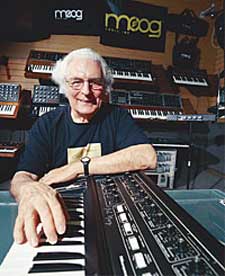Robert Moog: Difference between revisions
No edit summary |
m (Text replace - "[[Category:Culture and society" to "[[Category:Engineering and society") |
||
| (2 intermediate revisions by the same user not shown) | |||
| Line 1: | Line 1: | ||
== | == Biography == | ||
[[Image:Moog.jpg|thumb]] | |||
Born: 23 May 1934 <br>Died: 21 August 2005 | |||
Robert Moog ("Moog" rhymes with "vogue") has made several important contributions to electronic music and music in general in the 20th century. In fact, apart from a pair of summer jobs in the mainstream electronics industry, Moog has devoted his entire professional life to working on electronic musical instruments. An electronics engineer with bachelor’s degrees from Queens College and Columbia University in physics and electrical engineering, respectively, and a doctorate in engineering physics from Cornell University, Moog is best known as the inventor of [[Moog|the electronic synthesizer that bears his name]]. | Robert Moog ("Moog" rhymes with "vogue") has made several important contributions to electronic music and music in general in the 20th century. In fact, apart from a pair of summer jobs in the mainstream electronics industry, Moog has devoted his entire professional life to working on electronic musical instruments. An electronics engineer with bachelor’s degrees from Queens College and Columbia University in physics and electrical engineering, respectively, and a doctorate in engineering physics from Cornell University, Moog is best known as the inventor of [[Moog|the electronic synthesizer that bears his name]]. | ||
| Line 13: | Line 13: | ||
By designing and manufacturing the Moog Synthesizer and later more portable, less bulky models, such as the Minimoog, Moog was able to parlay his technical expertise into business success. Unfortunately the company ran into financial difficulty in the early 1970s, and Norlin Music bought Moog Music in 1973. Moog served as president of the Moog Music division until 1977, when he left Norlin citing corporate politics as the reason for his resignation. Moog's interest in designing and manufacturing electronic musical equipment did not end there, however, and he eventually repurchased the right to the Moog brand. Up until the time of his death in August 2005, he built and sold Theremins under his own name from a shop in Asheville, North Carolina. | By designing and manufacturing the Moog Synthesizer and later more portable, less bulky models, such as the Minimoog, Moog was able to parlay his technical expertise into business success. Unfortunately the company ran into financial difficulty in the early 1970s, and Norlin Music bought Moog Music in 1973. Moog served as president of the Moog Music division until 1977, when he left Norlin citing corporate politics as the reason for his resignation. Moog's interest in designing and manufacturing electronic musical equipment did not end there, however, and he eventually repurchased the right to the Moog brand. Up until the time of his death in August 2005, he built and sold Theremins under his own name from a shop in Asheville, North Carolina. | ||
[[Category:People and organizations|Moog]] [[Category:Engineers|Moog]] [[Category:Inventors|Moog]] [[Category:Engineering and society|Moog]] [[Category:Leisure|Moog]] [[Category:Music|Moog]] | |||
[[Category: | |||
Revision as of 16:45, 22 July 2014
Biography
Born: 23 May 1934
Died: 21 August 2005
Robert Moog ("Moog" rhymes with "vogue") has made several important contributions to electronic music and music in general in the 20th century. In fact, apart from a pair of summer jobs in the mainstream electronics industry, Moog has devoted his entire professional life to working on electronic musical instruments. An electronics engineer with bachelor’s degrees from Queens College and Columbia University in physics and electrical engineering, respectively, and a doctorate in engineering physics from Cornell University, Moog is best known as the inventor of the electronic synthesizer that bears his name.
As a child growing up in Queens, New York, Moog’s mother encouraged him to play the piano, while his father fostered an enduring interest in electronics. As an adolescent, Moog’s curiosity was piqued by a musical instrument known as the Theremin. Four years after building his first Theremin at the age of fifteen, Moog began selling build-your-own Theremin kits out of his apartment.
This combination of entrepreneurial acumen with a talent for electronics engineering continued to manifest itself after Moog received his doctorate, when he struck out on his own to create R. H. Moog Music (later Moog Music, Inc.). His most famous project was the Moog Synthesizer. Developed by Moog in the 1960s after close collaboration with composer Herbert A. Deutsch and others, the Moog synthesizer soon became valued by musicians for its adaptability and the elegance of the sounds it produced. Later, more compact versions made Moog’s invention one of the first synthesizers to be sold in relatively large numbers to musicians.
By designing and manufacturing the Moog Synthesizer and later more portable, less bulky models, such as the Minimoog, Moog was able to parlay his technical expertise into business success. Unfortunately the company ran into financial difficulty in the early 1970s, and Norlin Music bought Moog Music in 1973. Moog served as president of the Moog Music division until 1977, when he left Norlin citing corporate politics as the reason for his resignation. Moog's interest in designing and manufacturing electronic musical equipment did not end there, however, and he eventually repurchased the right to the Moog brand. Up until the time of his death in August 2005, he built and sold Theremins under his own name from a shop in Asheville, North Carolina.
